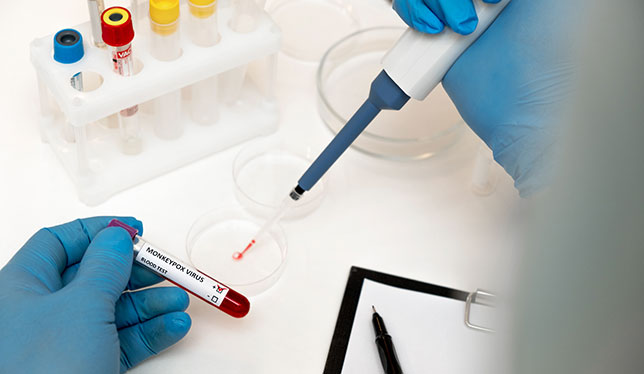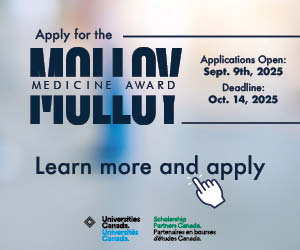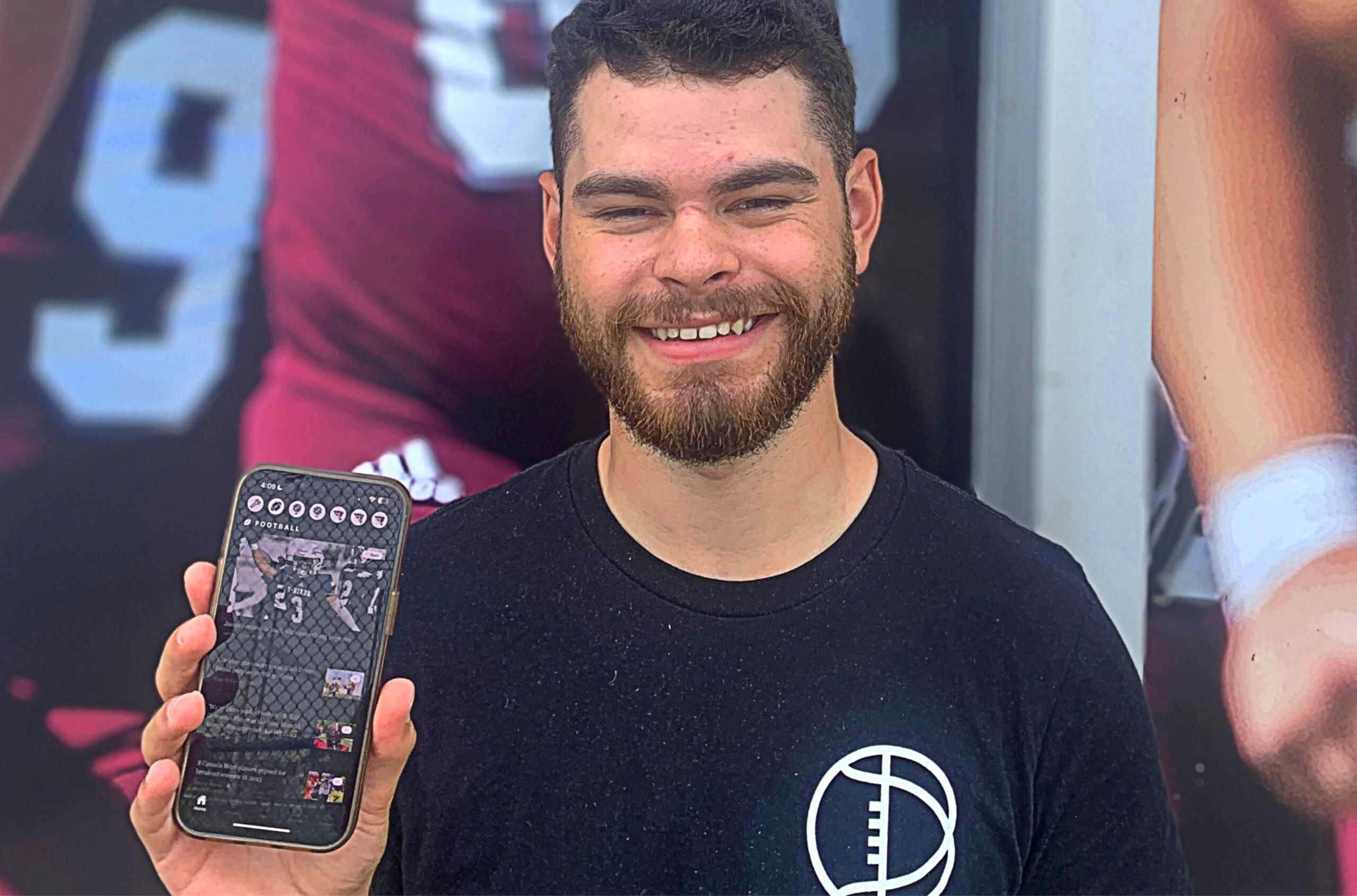Universities are monitoring the monkeypox threat as the fall session gets underway
According to one virologist, universities can help stop the spread of the disease by informing students about risks, prevention strategies and available resources.

After more than two years living with a pandemic, a new global health threat came to public attention this past May, when researchers and public health officials issued warnings about the spread of monkeypox. Unlike SARS-CoV-2, the coronavirus that causes COVID-19, the monkeypox virus isn’t new – it was first discovered in 1958 and is now endemic in several countries in West and Central Africa. What had experts concerned were clusters of the disease in countries like Canada, where monkeypox outbreaks hadn’t been seen before.
According to virologist Angela Rasmussen, the monkeypox virus isn’t as contagious or lethal as many of the 200 or so known types of animal-to-human infectious viruses, such as Ebola or SARS-CoV-2. But its continuing spread is still a serious public health hazard, and a reminder of how quickly transmissible diseases can become global pandemics.
“Monkeypox is a prime example of a neglected disease that is happening in poor endemic areas – but that is just an airline flight away from the rest of the world,” said Dr. Rasmussen, a senior scientist with the Vaccine and Infectious Disease Organization (or VIDO) at the University of Saskatchewan, where she works with the viral vaccine development group.
To stop the spread of monkeypox in its tracks, Dr. Rasmussen says large institutions – including Canadian universities – have an important role to play.
The monkeypox threat in Canada
As of mid-August, the World Health Organization reported more than 31,000 confirmed cases across 91 countries. Nearly 1,100 of those cases were in Canada, and more than 90 per cent of which were in Ontario, Quebec and British Columbia. The vast majority of sufferers are gay and bisexual men who contracted the virus through sexual activity.
Though most people who contract monkeypox experience mild flu-like symptoms and rashes before recovering on their own after a few weeks, Dr. Rasmussen warned against taking the threat of infection lightly. “It can kill pregnant women, young children and the immunocompromised,” said Dr. Rasmussen, “But death is not the only bad outcome. It can be extremely painful, leading to hospitalization. And since it is a pox virus, it is potentially disfiguring.”
She added that while vaccines against monkeypox exist, some scientists fear they have not been deployed effectively enough to stop the disease from spreading. “We can’t stigmatize the queer population because there is still debate over the mode of disease transmission,” she said. “But it is clear they are the most vulnerable group [and] available resources should be targeted to them.”
With fall academic semesters now underway across Canada, bringing together tens of thousands of students, faculty and staff in mostly large downtown campuses, Dr. Rasmussen said universities can and should be playing a leading role in informing students – especially those in the LGBTQ+ community – about the threat of monkeypox, the resources available to them, and what actions are required in the event of infection.
Universities respond
For their part, universities in Canada seem to be taking the threat of monkeypox seriously. In Toronto, where 75 per cent of monkeypox cases have been reported, staff at York University are keeping a close eye on the situation. Yanni Dagonas, deputy spokesperson at York, said the institution “is monitoring monkeypox closely and remains in contact with local public health agencies to stay up to date on information as it becomes available.” Reached in August, Mr. Dagonas also noted that York would provide information on monkeypox during student orientation at the start of the academic year.
“No specific recommendations have been made to the postsecondary sector [in regards to monkeypox],” he said by email. “York will adhere to the directions and recommendations of Canadian and Ontario public health agencies, should they be forthcoming.”
And if a case of monkeypox is reported on campus, Mr. Dagonas said York “will follow public heath recommendations closely.”
Officials with Toronto Metropolitan University in the city’s downtown core said they still have many COVID-19 protocols in place, such as surface disinfection and hand hygiene, that “should help” to prevent the spread of other infectious diseases like monkeypox.
“Additionally, we are developing protocols to manage cases that may occur on campus, specifically in residences,” reads a statement from the school. “We continue to follow Toronto Public Health guidance and liaise with them for recommendations on policies and/or protocols regarding the health and safety of the TMU community. …. We will update our community as more information becomes available.”
The University of Toronto has posted monkeypox-related information and resources to its website, but is otherwise taking the same approach as York and TMU. According to a statement from U of T’s media relations, the institution “continues to work with the appropriate offices and public health authorities to ensure student health and well-being, minimize disruption, and enable students to get the most out of their on-campus experience.”
Frédérique Mazerolle, a media relations officer with McGill University in Montreal, where most of Quebec’s 500-plus monkeypox cases have been reported, noted that the institution’s Student Wellness Hub provides health-related services, programs, outreach and information “for anything affecting their heath, including monkeypox.” She added: “The health and well-being of our community remain our top priority … and we will continue to work with public health and the Quebec government to ensure all necessary health and safety measures will continue to be implemented [so that] our campuses remain safe places to learn and to work.”
The director of student health services at the University of British Columbia in Vancouver, which had 80 per cent of the 125 confirmed cases of monkeypox in the province in late August, said the school is doing all it can to ensure the safety and security of students and staff this fall.
“UBC has developed a communicable disease prevention framework that outlines how the university, public health, and individuals work together to prevent the spread of communicable disease,” said Lauren Mathany. She noted that UBC is also working with public health units to eventually offer monkeypox testing and vaccines to students. Although public health guidelines currently prioritize gay men for testing and treatment, Ms. Mathany said the institution is “aware of public health concerns regarding stigma surrounding the disease” and that “any person who has close, prolonged contact with a person who has monkeypox may be at risk of infection, regardless of sexuality.”
Featured Jobs
- Science - Assistant Professor (Teaching)The University of British Columbia
- Psychology - Assistant Professor (Clinical Psychology)Queen's University
- Political Science - Assistant Professor (Political Theory)Saint Mary's University
- Canadian Politics - Assistant ProfessorUniversity of Toronto
- Chaire de recherche du Canada, niveau 2 sur l'inclusion dans l'éducation de la petite enfanceUniversité du Québec à Trois-Rivières (UQTR)












Post a comment
University Affairs moderates all comments according to the following guidelines. If approved, comments generally appear within one business day. We may republish particularly insightful remarks in our print edition or elsewhere.